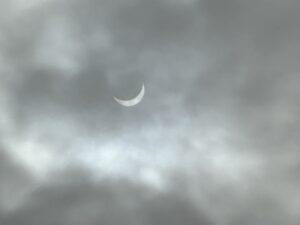
We had a fine view of the total solar eclipse on April 8 from the terrace of my best friend’s house in Buffalo. The clouds came and went, giving us hints of the drama behind them. Watching the sun’s disc shrink to a crescent through our eclipse glasses was awe-inspiring enough, but then when the cloud cover was just right, we could see the phenomenon in context with the naked eye. Here’s the sun coming back:

In an age when one can instantly retrieve high-resolution images of nature’s most dramatic sights, one can underestimate the power of being physically present. Sure, there are clearer photos on the Internet, but nothing compares to experiencing a historic moment with the people you love. The energetic resonance of sudden darkness at mid-day, or of the waters thundering over Niagara Falls at the golden hour, can’t be captured by our eyes alone.

Political analyst Sarah Kendzior expressed this eloquently in her latest Substack post, “The Path of Totality”. Sarah’s work is remarkable because she chronicles the ancient and imperiled beauty of the American landscape alongside our slide toward totalitarianism, holding the terrible alongside the sublime, not to cancel each other out, but to give us reasons to keep fighting.
We look to the skies because everyone on earth is lying. We look to an eclipse because it shows deception clearly. Here are how the pieces fit together, here is how fast darkness can come, and here is how fast it can depart. The world is not changed when it is over — but you are.
Sometimes, when people talk about the apocalypse, I wonder if we are already in hell, and days like this are glimpses of the heaven we squandered. That we had everything we needed and lost it in lust for lesser things. And I wonder how to get heaven back.
Subscribe to Sarah’s Substack. It’s free!
The confluence of the celestial and the political was on my mind in 2017, the last time we had a solar eclipse visible in the U.S., when I got the idea for the poem below. We had just returned from NecronomiCon, the cosmic horror fan convention. The indifference of the Elder Gods seemed less scary than the hatred brought into the open by a Trump presidency. The poem is reprinted from my book Made Man (Little Red Tree, 2022).
93 Minutes of Darkness
Do not call up that which you cannot put down.
— H.P. Lovecraft, “The Case of Charles Dexter Ward”
I
In Liberty, Greenville, Idaho Falls,
on summer-sprinkled lawns, in toolsheds
fumed with engine tinkering,
fathers hold nails in their mouths
building a viewing box.
In Leavenworth, Sweet Home, the other Cleveland,
in flour and mayonnaise kitchens,
when the moon is new
as a dark neighbor, when the radio
predicts the bodies’ line-up,
mothers clip out eye-holes.
From Excelsior Springs to Independence,
schoolchildren cover their faces
with official sunshades,
crayon the textbook pathway
by which their allotment of day
will soon be occluded.
YOU MUST BE IN THE SHADED BAND
(the “Path of Totality”)
TO SEE TOTALITY FROM SOUTH CAROLINA!
Nine in Charleston
will not see,
above the brooding steeple
of Mother Emanuel, the moon
drape a black veil over the sun’s church hat.
Marse Robert, the Marble Man,
will not see
the daytime shadow graze
his cracked-off pedestal
like a misfired Union minié ball.
And the lost cause’s buzz-cut acolytes
will not see,
in Charlottesville, any natural darkness
in the heavens
their torches smoke across.
You want to be somewhere in the dark band
on eclipse day!
II
Howard you thirsty boy
fascinated by the crumbling
foundations of Providence
the despised intertwining
of suckered flesh
through your dreams’ merciless orbits
Howard through the night rubbing
gravestones to reconstruct
origin and fall
scratching tales of the old man’s portrait
that possesses his weak-willed bloodchild
what a privilege to be horrified
by knowing your ancestors
Howard when the stars are right
will the earth be flooded
like a bursting mind
with memories of what oozed, invaded, flopped
in the infant darkness
will the slattern’s offspring with a god
colored invisible to human eyes
cry for its father on Federal Hill?
III
We’re kind of prepared
for the end of days here in Providence:
wearing lobsters on our hats,
cracking jokes about the democratic
maw of omnivorous Dagon.
It’s the birthday of the creator
of our universe, who is dead,
his stomach eaten
by its own cells, eighty years past.
South of us, starched ghosts
peering out through the masks
of great-grandfathers’ wars
scream “You will not replace us” to the sea
of earth-dark faces
who turned the soil without owning it,
as the rain does.
We’re north-northeast from the shadow
that will slice the map tomorrow,
what the news is calling
American eclipse. City of hills,
city where a role-play gamer’s dice
could tumble miles before hitting the tidal river
once laden with trade ships
of oysters, rum, and slaves.
What the news is calling
a rise in temperature.
We’re eating breakfast
in a grand ballroom, plasma of powdered eggs
on every plate while a black-hooded choir
sings monster parodies of tunes
our bodies still half believe,
about being rescued when we’re gone.
What the news is calling
our president. White headlights sweep the crowd.
A praying woman crumples
under aimed wheels, as a coastline slips
beneath lapping warmth.
The moon sweeps closer to the sun.